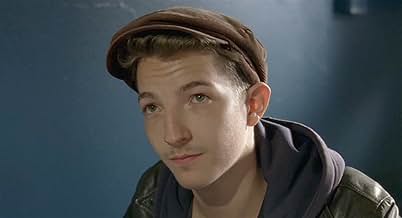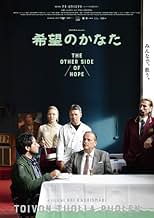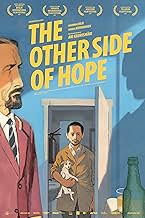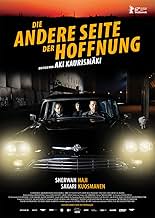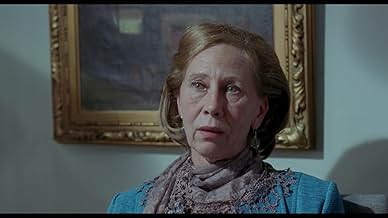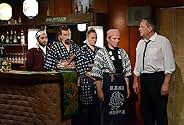IMDb रेटिंग
7.2/10
14 हज़ार
आपकी रेटिंग
पोकर खेलने वाला रेस्टोरेंट मालिक और पूर्व यात्रा विक्रेता, फ़िनलैंड में हाल ही में आए शरणार्थियों के समूह के साथ दोस्ती करता है.पोकर खेलने वाला रेस्टोरेंट मालिक और पूर्व यात्रा विक्रेता, फ़िनलैंड में हाल ही में आए शरणार्थियों के समूह के साथ दोस्ती करता है.पोकर खेलने वाला रेस्टोरेंट मालिक और पूर्व यात्रा विक्रेता, फ़िनलैंड में हाल ही में आए शरणार्थियों के समूह के साथ दोस्ती करता है.
- पुरस्कार
- 8 जीत और कुल 24 नामांकन
Abdi Jama
- Aseman kassa
- (as Abdi alias 'Lii' Jama)
Simon Al-Bazoon
- Mazdak
- (as Simon Hussein Al-Bazoon)
फ़ीचर्ड समीक्षाएं
Remember the pretty boy Ronan Keating singing that you say it best when you say nothing at all? Of course you don't, you only listen to good music. But this could be the very motto of Finnish legendary moviemaker Aki Kaurismäki's latest. This minimalist masterpiece is so achingly simple and elegant and yet so complex in a good way, that there's no really good way to describe it, if you don't understand Kaurismäki's style already. Toivon tuolla puolen" (The Other Side of Hope" in English, Teispool lootust" in Estonian") is like a haiku: it can convey so much with so little words and even so little action. I can't find fitting comparisions here, but Kaurismäki comes across like Jim Jarmusch's less snobish cousin: even more concentrated on what it's like to be human and small things that life is actually made of. They both value storytelling through details but Kaurismäki's approach is more mainstreamfriendly: you don't have to invest yourself fully all the time to make sense of what's going on exactly. Toivon tuolla puolen" offers two bittersweet stories interwining, about refugee in strange and hostile land and old entrepreneur who leaves his wife and finds fresh start in running a diner. It often feels like comedy – Kaurismäki's approach could be called Finnish version of Soviet nostalgia that many 30-year or older viewers will respond to and enjoy. Judging by Estonian premiere, it's a real crowdpleaser. But deeper down it's more about bleak and sad side of human existence: loneliness, being unwanted, trying to find purpose when everything has fallen down. And, of course, about how there's no winning with nowadays' refugee crisis – it brings suffering for everyone involved, except for maybe those who like to attack people who shouldn't be here". I give this quietly hilarious and heartbreaking masterpiece a near- perfect score. Although it doesn't break new grounds for Kaurismäki, I can't think of a way how it could be improved in any meaningful way. The movie's not gonna satisfy everybody, nothing will, but it's almost perfect the way it is. Deceptively simple but powerful experience that you can't imagine getting from anybody else than Kaurismäki.
Aki Kaurismäki's film 'The Other Side of Hope' is really two films in one: the first, a deadly serious look at the life of a Syrain refugee in Finland, and the other, a deadpan comic look at the escapades of an unlikely restauranteur. Oddly, it works, with its direct abutment of light and shade, and its playful treatment of the legendary Finish characteristic of taciturnity. A nice element of the movie is it's use of music as a symbol of our common humanity. It's a simple film, but I liked it.
After 'Le Havre', this is Kaurismäki's second film about refugees. This is a hot topic, now even more than ever. Europe is still trying to digest the influx of refugees from Syria and Iraq, a process with major political consequences.
There is no doubt about Kaurismäki's moral position. The lead characters in 'The other side of hope' don't even discuss if they should help the Syrian refugee Khaled, they just do it as if there is no other choice. In perhaps Kaurismäki's most political scene ever, a police officer tells Khaled that Aleppo, the city where he came from, is not unsafe according to the Finnish immigration authority, so he should be deported back to Syria. Immediately after the verdict, Kaurismäki shows a news report on Finnish television about the atrocities going on in Aleppo.
The complete lack of emotions, a trademark feature of Kaurismäki's work, adds an extra dimension to the message. The refugee doesn't complain, his protectors don't discuss, the violent racists don't explain. Everything just happens.
Of course, this being a Kaurismäki film, there are the typical elements of his movies: the fifties aesthetics, the deadpan humor, the stripped-to-the-bone dialogue. Music is also an important element in this film. It is, without exception, source music from musicians playing in bars, café's or in the street. It is all sung in Finnish, but has a very bluesy feeling, perfectly matching the overall mood of the film.
The screenplay has a special structure: for the most part of the film, the viewer is watching two separate stories. One is about the refugee Khaled entering the country as a stowaway in a cargo ship, trying to find his way in society and being processed by the immigration authority. The other is about a business man trying to revive an unprofitable restaurant. Of course, the two are destined to run into each other.
Kaurismäki is one of those film makers whose style is unique and doesn't resemble anything else. For that reason alone, his work is worth watching. In this film, he adds a political message which is as urgent as can be.
There is no doubt about Kaurismäki's moral position. The lead characters in 'The other side of hope' don't even discuss if they should help the Syrian refugee Khaled, they just do it as if there is no other choice. In perhaps Kaurismäki's most political scene ever, a police officer tells Khaled that Aleppo, the city where he came from, is not unsafe according to the Finnish immigration authority, so he should be deported back to Syria. Immediately after the verdict, Kaurismäki shows a news report on Finnish television about the atrocities going on in Aleppo.
The complete lack of emotions, a trademark feature of Kaurismäki's work, adds an extra dimension to the message. The refugee doesn't complain, his protectors don't discuss, the violent racists don't explain. Everything just happens.
Of course, this being a Kaurismäki film, there are the typical elements of his movies: the fifties aesthetics, the deadpan humor, the stripped-to-the-bone dialogue. Music is also an important element in this film. It is, without exception, source music from musicians playing in bars, café's or in the street. It is all sung in Finnish, but has a very bluesy feeling, perfectly matching the overall mood of the film.
The screenplay has a special structure: for the most part of the film, the viewer is watching two separate stories. One is about the refugee Khaled entering the country as a stowaway in a cargo ship, trying to find his way in society and being processed by the immigration authority. The other is about a business man trying to revive an unprofitable restaurant. Of course, the two are destined to run into each other.
Kaurismäki is one of those film makers whose style is unique and doesn't resemble anything else. For that reason alone, his work is worth watching. In this film, he adds a political message which is as urgent as can be.
Finnish director, Aki Kaurismäki has successfully established himself as a respectable auteur in world cinema. When it was announced after the release of Kaurismäki's last film "Le Havre" (2011) that it would be followed by another film covering similar topics and themes, audiences have been anxiously waiting for his next effort. Thus, six years later, comes "The Other Side of Hope" (2017, "Beyond Hope" literally), a film that Kaurismäki wanted to get out before it was too late. One should not be surprised by such openness about the film's political agenda given Kaurismäki's usual tendencies to do so. Nor should one be surprised by the fact that "The Other Side of Hope" is everything one could expect from Kaurismäki: an immediately recognizable film belonging to the canon of his oeuvre. While some Finnish critics have been disappointed by the lack of innovation or regeneration from Kaurismäki, they have failed to appreciate that often the best artists keep doing the "same" over and over again -- think of Ozu and Hawks, for instance, both of whom Kaurismäki adores tremendously.
Like "Le Havre", "The Other Side of Hope" also tells the story about a refugee encountering a European local. The small port town of Le Havre in France has been changed to Helsinki in Finland and the North-African refugee to a Syrian. The film follows Khaled's (played by Sherwan Haji) day- to-day activities in the red tape of immigration policy, his attempts to track down his lost sister, and his conflicts with locals as well as a parallel story about a Finnish man (played by Kaurismäki regular Sakari Kuosmanen) who leaves his wife and starts up a restaurant which eventually leads him to meet Khaled.
As mentioned above, one can recognize the film as Kaurismäki's instantly. The cinematography is often static by nature (even camera movement is rather mechanic), the acting is deadpan and the actors' delivery is laconic to the bone, there is nostalgic popular music, and mise-en-scène is characterized by vintage elements from old cars to type writers as well as classic Hollywood lighting. These cinematic means often give an ironic impression which, nonetheless, never reduces the film to a parody of itself; it manages to take itself seriously while joking around, so to speak. They also constitute an extremely economic narrative where a wordless act such as the placing of a ring on a kitchen table can say more than a thousand words. In terms of tone, Kaurismäki's film lies securely in between of tragedy and comedy, cynicism and humanism, melancholy and laughter.
In this world of deep contradictions -- not only in tone, of course, but also in, say, the co- existence of vintage elements in mise-en-scène with modern technology -- Kaurismäki's characters often find themselves to be strangers. They are strangers essentially in two senses. First, they are strangers of society; they are thugs, loners, divorced, unemployed, homeless, and refugees. Second, they are strangers of existence; their being in the world is twisted in the sense that they talk absurdly little, do not notice the absurdities of the fictive world with its contradictions, stand still for long periods of time, and can suddenly announce that they will move to Mexico City for a change of scenery without giving rise to any trace of astonishment in their interlocutors.
It seems to me that Kaurismäki's phenomenology of strangeness, if I may give it such a hasty word, has gained significant new dimensions in his contemporary cinema of global ethics. The strangers of "The Other Side of Hope" find comrades in each other without a need to announce it. They are the global working class with no nation. They are a plural bunch whose shared humanity overcomes individual differences. In a key scene echoing "Le Havre", there is a moving montage of human faces as the refugees in the reception center listen to a wordless ballad by Khaled. It is a very Kaurismäki-esque moment of cinematic personality, but here the strangeness seems to articulate heavily moral meanings in particular.
While the film is unapologetically moral and political in its message and agenda, it also comes across as a good piece of cinema with a poetry all its own (that is, the cinematic poetry of Kaurismäki's cinema in general, to be precise). Like many other films by Kaurismäki, sea is an essential element, which might represent the film's success in finding a place between poetry and politics. "The Other Side of Hope" begins with a beautiful shot of the Baltic Sea. To Peter von Bagh, a Finnish film critic and historian, all cinematic images of sea are masterful. The beauty of the sea is easily captured in a way which makes everyone a master. Yet, in order for us to care about these images, something has to happen -- either in terms of story, theme, or aesthetics -- in their appropriate contexts. In this sense, Kaurismäki delivers. The other side of hope, or its vague image in the world beyond, finds its elusive face on the surface of the sea. When Peter von Bagh passed away in 2014, Kaurismäki promised to dedicate his next film to von Bagh's memory, adding that "only if it is good enough." He did.
Like "Le Havre", "The Other Side of Hope" also tells the story about a refugee encountering a European local. The small port town of Le Havre in France has been changed to Helsinki in Finland and the North-African refugee to a Syrian. The film follows Khaled's (played by Sherwan Haji) day- to-day activities in the red tape of immigration policy, his attempts to track down his lost sister, and his conflicts with locals as well as a parallel story about a Finnish man (played by Kaurismäki regular Sakari Kuosmanen) who leaves his wife and starts up a restaurant which eventually leads him to meet Khaled.
As mentioned above, one can recognize the film as Kaurismäki's instantly. The cinematography is often static by nature (even camera movement is rather mechanic), the acting is deadpan and the actors' delivery is laconic to the bone, there is nostalgic popular music, and mise-en-scène is characterized by vintage elements from old cars to type writers as well as classic Hollywood lighting. These cinematic means often give an ironic impression which, nonetheless, never reduces the film to a parody of itself; it manages to take itself seriously while joking around, so to speak. They also constitute an extremely economic narrative where a wordless act such as the placing of a ring on a kitchen table can say more than a thousand words. In terms of tone, Kaurismäki's film lies securely in between of tragedy and comedy, cynicism and humanism, melancholy and laughter.
In this world of deep contradictions -- not only in tone, of course, but also in, say, the co- existence of vintage elements in mise-en-scène with modern technology -- Kaurismäki's characters often find themselves to be strangers. They are strangers essentially in two senses. First, they are strangers of society; they are thugs, loners, divorced, unemployed, homeless, and refugees. Second, they are strangers of existence; their being in the world is twisted in the sense that they talk absurdly little, do not notice the absurdities of the fictive world with its contradictions, stand still for long periods of time, and can suddenly announce that they will move to Mexico City for a change of scenery without giving rise to any trace of astonishment in their interlocutors.
It seems to me that Kaurismäki's phenomenology of strangeness, if I may give it such a hasty word, has gained significant new dimensions in his contemporary cinema of global ethics. The strangers of "The Other Side of Hope" find comrades in each other without a need to announce it. They are the global working class with no nation. They are a plural bunch whose shared humanity overcomes individual differences. In a key scene echoing "Le Havre", there is a moving montage of human faces as the refugees in the reception center listen to a wordless ballad by Khaled. It is a very Kaurismäki-esque moment of cinematic personality, but here the strangeness seems to articulate heavily moral meanings in particular.
While the film is unapologetically moral and political in its message and agenda, it also comes across as a good piece of cinema with a poetry all its own (that is, the cinematic poetry of Kaurismäki's cinema in general, to be precise). Like many other films by Kaurismäki, sea is an essential element, which might represent the film's success in finding a place between poetry and politics. "The Other Side of Hope" begins with a beautiful shot of the Baltic Sea. To Peter von Bagh, a Finnish film critic and historian, all cinematic images of sea are masterful. The beauty of the sea is easily captured in a way which makes everyone a master. Yet, in order for us to care about these images, something has to happen -- either in terms of story, theme, or aesthetics -- in their appropriate contexts. In this sense, Kaurismäki delivers. The other side of hope, or its vague image in the world beyond, finds its elusive face on the surface of the sea. When Peter von Bagh passed away in 2014, Kaurismäki promised to dedicate his next film to von Bagh's memory, adding that "only if it is good enough." He did.
In Aki Kaurismäki's 2016 film TOIVON TUOLLA PUOLEN ("The Other Side of Hope"), the Finnish auteur continues a theme he explored in LE HAVRE from five years earlier: refugees fleeing to Europe and forced to survive when heartless officials and some locals are against them. While that earlier film was shot in the comparatively exotic setting of the eponymous French port, TOIVON TUOLLA PUOLEN returns to Kaurismäki's familiar stomping grounds of downtown Helsinki.
The film consists of two converging plot lines. In one, the aging salesman Wikström (Sakari Kuosmanen, a longtime member of Kaurismäki's acting stable) leaves his wife, wins a lot of money in a poker game, and decides to open a restaurant. In the other, the Syrian refugee Khaled (Sherwan Haji) arrives in Helsinki after fleeing war-torn Aleppo and wandering across half of Europe, but he is worried about his sister that he got separated with along the way. Wikström and Khaled eventually meet and become friends -- or the closest thing to friends that Kaurismäki's exaggeratedly cold and morose Finns can get to each other. Before that, however, the Wikström plot line serves to inject some humour, albeit of an extremely deadpan sort, into a film that, though Khaled, explores the depressing lives of refugees who are shuffled from one center to another and forced to wait for their cases to be processed.
For three decades now, Kaurismäki has made all his films to a very distinctive template that virtually never varies. Its characters speak a minimum of dialogue to each other and show little expression on their faces. The sets are drab in colour and deliberately anachronistic, with gadgets, vehicles or clothes from the 1950s alongside computers and mobile phones from our time. At some point, a band will appear on stage playing oldies rock, blues, or Finnish tangos as the characters look on.
TOIVON TUOLLA PUOLEN doesn't stray from that template either. Still, the script has enough fresh moments to it that it will feel worthwhile even to longtime Kaurismäki films who have sat through this template many times before. Some of the humorous bits are laugh-out-loud funny, but overall this does feel like a darker film than most of the director's work. It is ultimately a choked, restrained cry of rage at the way that refugees are treated, by a Nordic society that prides itself on fairness, equality and charity. While Kaurismäki is roughly on the left politically, several of his films have attacked the Finnish welfare state for its opaque bureaucracy and its reduction of human beings to mere papers in a government file. This film continues that critique by depicting the refugees, who come from many countries but manage to band together to lend each other help, as the sort of neighborly solidarity that Kaurismäki prefers to faceless bureaucracy.
I personally wouldn't find this the best introduction to Kaurismäki. His earlier film MIES VAILLA MENNEISYYTTÄ ("The Man Without a Past") depicted with more meat on its bone a down-on-his-luck man lost among bureaucracy, while the über-idiosyncratic romantic comedy VAROJA PARATIISISSA ("Shadows in Paradise") is one of Kaurismäki's best achievements in deadpan humour. Still, TOIVON TUOLLA PUOLEN seems to tell a story universal enough to pull on everyone's heartstrings and is worth seeing.
The film consists of two converging plot lines. In one, the aging salesman Wikström (Sakari Kuosmanen, a longtime member of Kaurismäki's acting stable) leaves his wife, wins a lot of money in a poker game, and decides to open a restaurant. In the other, the Syrian refugee Khaled (Sherwan Haji) arrives in Helsinki after fleeing war-torn Aleppo and wandering across half of Europe, but he is worried about his sister that he got separated with along the way. Wikström and Khaled eventually meet and become friends -- or the closest thing to friends that Kaurismäki's exaggeratedly cold and morose Finns can get to each other. Before that, however, the Wikström plot line serves to inject some humour, albeit of an extremely deadpan sort, into a film that, though Khaled, explores the depressing lives of refugees who are shuffled from one center to another and forced to wait for their cases to be processed.
For three decades now, Kaurismäki has made all his films to a very distinctive template that virtually never varies. Its characters speak a minimum of dialogue to each other and show little expression on their faces. The sets are drab in colour and deliberately anachronistic, with gadgets, vehicles or clothes from the 1950s alongside computers and mobile phones from our time. At some point, a band will appear on stage playing oldies rock, blues, or Finnish tangos as the characters look on.
TOIVON TUOLLA PUOLEN doesn't stray from that template either. Still, the script has enough fresh moments to it that it will feel worthwhile even to longtime Kaurismäki films who have sat through this template many times before. Some of the humorous bits are laugh-out-loud funny, but overall this does feel like a darker film than most of the director's work. It is ultimately a choked, restrained cry of rage at the way that refugees are treated, by a Nordic society that prides itself on fairness, equality and charity. While Kaurismäki is roughly on the left politically, several of his films have attacked the Finnish welfare state for its opaque bureaucracy and its reduction of human beings to mere papers in a government file. This film continues that critique by depicting the refugees, who come from many countries but manage to band together to lend each other help, as the sort of neighborly solidarity that Kaurismäki prefers to faceless bureaucracy.
I personally wouldn't find this the best introduction to Kaurismäki. His earlier film MIES VAILLA MENNEISYYTTÄ ("The Man Without a Past") depicted with more meat on its bone a down-on-his-luck man lost among bureaucracy, while the über-idiosyncratic romantic comedy VAROJA PARATIISISSA ("Shadows in Paradise") is one of Kaurismäki's best achievements in deadpan humour. Still, TOIVON TUOLLA PUOLEN seems to tell a story universal enough to pull on everyone's heartstrings and is worth seeing.
क्या आपको पता है
- ट्रिवियाThe actors playing siblings Khaled and Miriam are real-life siblings.
- कनेक्शनFeatured in Ismo Haavisto One Man Band: Midnight Man (2017)
- साउंडट्रैकOi mutsi, mutsi
Written and performed by Tuomari Nurmio
टॉप पसंद
रेटिंग देने के लिए साइन-इन करें और वैयक्तिकृत सुझावों के लिए वॉचलिस्ट करें
- How long is The Other Side of Hope?Alexa द्वारा संचालित
विवरण
- रिलीज़ की तारीख़
- कंट्री ऑफ़ ओरिजिन
- आधिकारिक साइटें
- भाषाएं
- इस रूप में भी जाना जाता है
- The Other Side of Hope
- फ़िल्माने की जगहें
- हेल्सिंकी, फ़िनलैंड(The city)
- उत्पादन कंपनियां
- IMDbPro पर और कंपनी क्रेडिट देखें
बॉक्स ऑफ़िस
- बजट
- €16,00,000(अनुमानित)
- US और कनाडा में सकल
- $1,83,943
- US और कनाडा में पहले सप्ताह में कुल कमाई
- $15,495
- 3 दिस॰ 2017
- दुनिया भर में सकल
- $42,82,973
- चलने की अवधि1 घंटा 40 मिनट
- रंग
- ध्वनि मिश्रण
- पक्ष अनुपात
- 1.85 : 1
इस पेज में योगदान दें
किसी बदलाव का सुझाव दें या अनुपलब्ध कॉन्टेंट जोड़ें



